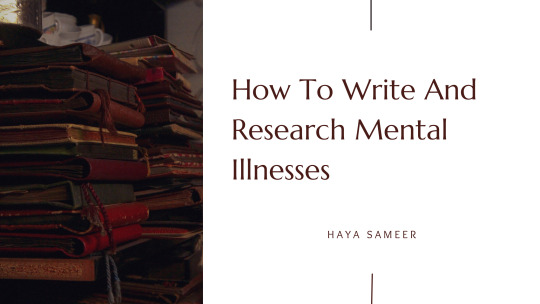#Writer speaks
Explore tagged Tumblr posts
Text
Also a newer song from my favorite band gives me Milan and Ranva vibes
63 notes
·
View notes
Text
Just doing this bc I'm curious/research reasons

#tropes#writing#black widow#villainelle#yelena belova#atomic blonde#idk there's so many others to tag here omg#writer speaks
9K notes
·
View notes
Text
What happens when people open their hearts?
“They get better.”
- Murakami, Norwegian Wood
#haruki murakami#murakamiharuki#norwegian#bookstagram#catcher in the rye#franz kafka#kafka on the shore#kafkaesque#mahmoud darwish#donna tartt#the secret history#bookstore#books & libraries#books#dead poets society#writer speaks#writers and poets#dark grunge#dark academia#dark acadamia aesthetic#sylvia plath#picture of dorian gray#charles bukowski#book quote#the letters of sylvia plath
447 notes
·
View notes
Text
How To Write And Research Mental Illnesses

Mental illnesses are a large aspect of literature often incorporated into various different genres. However, even with their prevalence, many authors are often unaware of how to write about mental illnesses accurately. If you’re an author writing a character with a mental illness, here are some tips on how to write with mental illnesses.
Don’t ‘Self Diagnose’ Your Characters
When writing about mental illnesses it’s important to consider whether or not your character would realistically have this mental illness given their situation and story. Many authors often ‘self diagnose’ their characters without actually taking the time to research these illnesses and figure out whether their character would develop this illness if they were a real person.
I say ‘self diagnose’ because as authors we generally do diagnose our characters based on our own interpretations and plans for them and their story, without looking to real people with these illnesses.
Just because your character is going through an unproductive slump doesn’t mean they they are depressed. Just because your character is nervous and experiencing stage fright doesn’t mean they have anxiety.
Take the time to look into these mental illnesses and genuinely consider whether or not your character has a mental illness, or if you’re just self diagnosing and wrongly labelling them.
Do Your Research
Whenever I blog about such sensitive topics, I always find myself ultimately mentioning this one point. This is because even with so many resources available to us both online and offline, writers still choose to be blissfully unaware of sensitive topics mentioned in their WIPs or stories.
I sincerely cannot stress how important it is for a writer to do their due diligence and research the topics they write for, especially if it is something as sensitive as mental illnesses.
Once you have established that your character would realistically develop or undergo a mental illness given the situation they are in, it is now time to research what exactly they would go through.
A simple google search can tell you everything you need to know about your character’s mental illness. Or, you could reach out to people you know who suffer from the same illness and ask them questions about it.
Researching your character’s mental illness helps ensure you don’t accidentally misrepresent that illness or create symptoms that are inaccurate and insulting to people who do suffer from that mental illness. It will also provide you with a sense of ease as an author, and allow you to work on your WIP without having to worry about accidentally offending an entire community.
Remember The Three Ss
One of the biggest challenges writers face with writing with mental illnesses is unrealistic representation. Unsure where to start with your research? Here is a simple guide for you to keep in mind.
When writing about mental illnesses, you need to recall the three Ss:
Symptoms
Side effects
Stages
Symptoms
Every illness or disease has its own symptoms, the same applies to mental illnesses. When writing about a character with mental illnesses, you need to take the time to research the symptoms of this illness and how these symptoms can impact your character on a day-to-day and general level.
For example, a character with PTSD would face trouble sleeping and concentrating, would be irritable, angry and face overwhelming guilt or shame. These symptoms can all make it hard for a person to excel at school or the workplace and can lead to delayed deadlines, unfinished work, and a lot of stress and anxious thinking.
A character with PTSD would likely not be able to handle being at the top of their class, unless they completely engross themselves in their studies to the point where they can’t think of anything except that. However, if that were the case then they would find it very hard to handle ‘normal’ situations and wouldn’t be getting a lot of sleep.
Side Effects
A side effect is a temporary and commonly unwanted effect of a drug or medical condition. Unlike a symptom, a side effect can be harmful or beneficial and most go away on their own over time.
They wouldn’t be considered as ‘serious’ as a symptom, however, they can still significantly impact your character, their story, and their dynamics with the characters they interact with.
Following the above example, a character with PTSD would generally suffer from an inability to develop or maintain positive, healthy interpersonal relationships and an inability to trust others. They also often face side effects such as social isolation, chronic feelings of fear, etc.
These are all side effects that would make it hard for a character with PTSD to maintain emotional relationships. You can use this to portray their sudden lack of connection with friends and family, and how they find themselves only associating with people who have either been through or understand their situation.
Stages
A person with cancer, or other such physical illnesses, doesn’t suddenly hit a chronic level overnight. The same logic applies to mental illnesses. Mental illnesses don’t just develop overnight. Your character won’t suddenly wake up one day in chapter ten and have a full-blown panic attack because they developed a panic disorder.
Yes, people can face symptoms or side effects pertaining to a mental illness after facing a traumatic event. However, when writing about such events, it’s very important to do your research and consider whether or not a person would realistically undergo such serious symptoms in such a small timeframe given the circumstances.
Outside of incidents that are a direct result of a traumatic event, it’s important to consider the stages your character would experience as a result of their mental illness.
For example, a person with PTSD goes through five stages, the first being the impact or emergency stage, during which they struggle to process or deal with the situation they have gone through. Then comes the denial or numbing stage.
Following the above example, a numbing stage would be akin to when a character pretends the traumatic event never occurred and throws themselves into their work or school. Then comes a rescue stage, which would be when other characters begin to intervene or when the character comes to terms with the events and starts to better themselves.
Knowing the stages of your character’s mental illness allows you to accurately plan out what happens in your story and create a realistic portrayal of their suffrage. It also helps flesh out your story for your readers and allows you to seamlessly incorporate your character’s illness into the story.
Don’t Define Them By Their Mental Illness
Now that you have a general idea of how to write and research mental illnesses, I would like to end this blog post with a small reminder. People with mental illnesses are human. They have personalities, hobbies, likes, dislikes, and other such traits that often have nothing to do with their mental illness.
When writing with a mental illness, it’s important to take this into account and ensure you don’t constantly define your character by their mental illness, or even worse, reduce them to their mental illness.
I hope this blog on how to write and research mental illnesses will help you in your writing journey. Be sure to comment any tips of your own to help your fellow authors prosper, and follow my blog for new blog updates every Monday and Thursday.
Looking For More Writing Tips And Tricks?
Are you an author looking for writing tips and tricks to better your manuscript? Or do you want to learn about how to get a literary agent, get published and properly market your book? Consider checking out the rest of Haya’s book blog where I post writing and marketing tools for authors every Monday and Thursday.
#writing community#haya's book blog#haya blogs#hayatheauthor#writing tools#creative writing#writing tag#writing tips and tricks#writing tips#writing tip#writing troubles#writing things#writing advice#writing resources#writing research#writing inspo#writing improvement#writing help#writing mental illness#writer community#writer things#writer tips#writer speaks#writer struggles#female writers#writer resources#writer advice#writer inspiration#writer tag
1K notes
·
View notes
Text
My characters really gonna need some botox for the amount of furrowing their brows do.
#a03 writer#creative writing#fiction#original story#writer#writers on tumblr#writers and poets#writing#writing life#writerscommunity#writers#writeblr#writer problems#writer prompts#writer probz#writers block#female writers#ao3 writer#writer struggles#writer stuff#writer speaks#writer support#writer spotlight
25 notes
·
View notes
Text
being a writer is simply trying to escape a writer’s block by pretending you won’t get the writer’s block if you continue writing, even if it is nonsense. being a writer is wishing you were the one who wrote that thought provoking line you just read online. being a writer is having the most refined sense of grammar while penning yet unable to pronounce a simple word when you are in public. being a writer is observing every little thing a person says or does because they are definitely going to write about it and being a writer is having the most messed up sleep schedule because the moon is often their muse. <3
#born with a poet's soul#the moon is my muse#writer speaks#writers on tumblr#writers and poets#desiblr#desi tag#desi tumblr#desi academia
54 notes
·
View notes
Text









Peak girlhood experience
#writers on tumblr#poets on tumblr#dead poets society#today on tumblr#writer speaks#dark academia#dark academia aesthetic#poetsandwriters#aesthetic#collage#quotes
24 notes
·
View notes
Text
Dear anons,
If a writer's form of content is not to your liking, there isn't a need to barge into our inbox and TELL us that it's bad and we should seek help from others for improvement. We never asked, so we don't want to hear it. Most of the time, you all don't even know how to give proper feedback, so we don't want it.
We write for ourselves and our comfort. If you don't like a style of content or writing, unfollow, block tags, or come off the site. Attacking writers and claiming your advice was feedback is absolute entitlement. Writing isn't easy!
Sincerely,
Every writer who has gone through this shit
70 notes
·
View notes
Text

Don't normally post these sort of things, but, was lucky enough to see the national tour of Beetlejuice. All I can say is WOW. Easily one of the best productions I have ever seen. Everything from performance to sound to set design. The theatre geek in me ascended. It beat all expectations. So happy to have had the chance to finally see it after missing it twice on Broadway! Major SUCKS-YES for all those involved. If you have the chance to see it if it comes to your area, do it.
25 notes
·
View notes
Text
Writer ask game! (Both fanfic writers and non-fanfic writers)
1: What is the best compliment you've gotten on any of your works?
2: Do you have readers that you recognize by name (even if they may not comment regularly)?
3: Do you have scheduled uploads and if so, when?
4: How long was the longest work you've written?
5: What is your go-to way to deal with writers block?
6: Do you have a motivational cycle? (As in phases in which you barely write and phases in which you write so much holy shit)
7: How long are your uploads in regular?
8: Do you look through any and all replies to your work? Why?
9: What genre is your favourite to write?
10: Do you read and write similar stuff or are there differences?
11: What kind of relationships do you like writing best? (Family, platonic, romantic, etc.)
12: Do you write in your first language? Multiple languages? A secret, third option?
13: How many WIPs do you have open?
14: What POV do you write? First person, second person, third person?
15: What is the weirdest thing you had to look up for writing?
16: What is something you didn't have to look up but is still weird to know?
17: Could you or could you not successfully pull of a murder (at least in theory)?
18: Do you have a beta reader?
19: Do you edit your works?
20: Do you start on new ideas immediately or do you write them down until after you finish your current WIP?
21: How serious do you take your writing? Do you get money for it? Do you want to? Is it a hobby or a profession?
22: How often do you write fanfic? (From not at all to exclusively)
23: Is there a project you want to talk about?
24: Do you stick to the same writing style or do you try out new things when you can?
25: Have you ever gotten hate and if so, how did you deal with it?
26: Do you have a special writing process you have to follow every time you write?
27: How many people you know irl read what you're writing?
28: What would you say is your specialty in writing?
29: Do you listen to music while you write? If so, what kind?
30: What is, in your opinion, the greatest achievement that you have reached in writing?
Please don't feel pressured to answer anything you're not comfortable with!
#writer things#writing side of tumblr#writer speaks#writing#writers on tumblr#writer ask game#ask game#writer stuff#fanfiction writer#writers on ao3#questions for writers#i have written writers so often it doesn't look like a word anymore#please feel free to give me numbers to answer as well
235 notes
·
View notes
Text
I know I said it before but Aiden in a red cloak is something I need sooo bad. Maybe the knights dress him up in one when they want to sacrifice him? At least then I’d have a reason and it would fit too I think 😭
67 notes
·
View notes
Text



Please reblog for more results!
24 notes
·
View notes
Text
Oh dear diary I met a girl, she made my dull heart light up with joy...
No amount of time with her is ever enough, she brings me the peace I craved before...



Moments with her are never dull, yeah she is the moon to my little world,
She's my precious and I want to hide her from the world.



Her existence is blessing to me, I healed from my past just because of her...
She's someone who pushes me forward, so I can't imagine my life without her.



Oh dear diary I met a girl....
She's my love, my muse and my girl.
#alhad si simran#short poem#for her#spilled words#spilled thoughts#writers and poets#just a try#she wrote so I thought I should do the same#her <3#her smile#writer speaks#spilled emotions#spilled quotes#quotes#love#short poems#poemsociety#my girl#desiblr#desi#dark acadamia aesthetic#dark academia#poem#for you#❤️
140 notes
·
View notes
Text
How To Write A Compelling Character Arc

A character arc is a measure of how a character changes over time. These arcs are linear, which means they have a start and a conclusion. Character arcs are a significant aspect of any novel as they help clearly translate your character’s struggles and personal developments to your readers.
Unsure how to write a compelling character arc for your protagonist or other characters? Here are some tips to help you get started!
Pick A Type Of Arc
In order to create a compelling and successful character arc, you first need to recognise which type of arc is your character going to experience. Over the years people have developed various character arc types, however, there are three significant types every writer needs to be aware of when plotting their character’s story.
Positive Character Arcs
Positive character arcs are simply that—a character arc that results in a positive journey or development.
A majority of books and movies or other cinematic pieces feature positive character arcs. This is because everyone enjoys a happy ending. An ending that makes you feel fulfilled and excited for the protagonist’s journey, or brings tears to your waterline as you reminisce on how far they’ve come, and how much they deserve this positive ending.
A positive character arc doesn’t necessarily have to have a ‘’happily ever after’ however it needs to have a happy ending. If a character’s family was assassinated and at the end they get revenge on the antagonist who murdered their loved ones while developing themselves mentally, then that counts as a positive character arc.
When writing a positive character arc it’s important to keep a few things in mind, such as:
You need to end on a positive note. Things can be as chaotic as you want it to be, but you need to have a positive ending. Otherwise, you cannot define your character arc as positive.
Your protagonist needs to develop as a character. Whether that be mentally, emotionally, financially, etc.
Your protagonist cannot end up where they started. A character arc that ends in a full circle is more of a flat character arc than a positive one.
Negative Character Arcs
Just like a positive character arc, a negative one is very easy to explain. This is a character arc that is typically used when writing antagonists in the entertainment industry due to the negativity it brings. When writing a negative character arc for a protagonist you run the risk of making your readers feel unsatisfied or creating a ‘bad ending’.
Some examples of a negative character arc for a protagonist would be if the protagonist dies at the end of the book, or if the protagonists almost achieve their final goal but fail by a small shortcoming. Negative character arcs for a protagonist are usually implemented for the first few books of a series, especially in fantasy books.
Using a negative character for your antagonist is simple—they fail. The protagonist wins and the villain dies or gets locked up until their final moments.
When employing a negative character arc for a protagonist, here are some things to keep in mind:
They shouldn’t end up as a person similar to what they started off as. The point is to corrupt them, ruin them and turn them to the bad side. Perhaps even make them fall victim to the antagonists.
They can’t or will never achieve their long-term goal. Remember that goal you established at the start of your book? Your protagonist cannot achieve that. Or at least, they will never achieve it due to certain plot developments.
They lose someone or thing important to them. Negative character arcs for a protagonist are generally triggered due to the loss of someone or thing important to the protagonist. Maybe their mentor is murdered by the government, or their failure to achieve their goals makes them turn evil.
Flat Character Arcs
Flat character arcs are arcs that essentially lack any sort of arc. They are flat and begin and end with the character as the same type of person.
These arcs are generally used for side characters, but they can also be used for a protagonist. Think of characters like Sherlock Holmes, James Bond, etc. They go through several trials and tribulations, but even after it all their personality remains the same.
When writing a flat character arc it’s important to remember that your character cannot undergo any significant personality changes. Your protagonist can undergo such changes during the story, but they need to have a full circle by the end.
Divide Your Arc Into Short-Term Goals
Once you’ve decided where you want your character to end up at the end, you now need to know how they will get there. You can achieve this by referring to your long-term goal and then breaking them down into short-term goals.
The protagonist is supposed to find a hidden jewel at the end of the book and discovers how corrupt their government is. Alright, now break that down into short-term goals that will help your protagonist get to their end goal.
Group these goals and they will become stages for your book, break them down and you now have chapter outlines to work with.
Playing with the details of your character arcs can help you easily plan out your book’s plot and set a steady pace. You can also use this as a reference sheet when working on your WIP.
Take The World Outside Your Protagonist Into Perspective
Once you know the type of character arc you want and how you’re going to write it, it’s important to consider how this arc will impact your world. This includes your side characters as well as the general plot and layout of your world.
Character Arcs For Side Characters
It isn’t necessary to have a character arc for every single character, but it is almost impossible for only two characters to have an arc within hundreds of pages.
Whether it be your protagonist’s mentor or your antagonist’s assistant, it’s important to take their stories and personal development into consideration. How does the story’s plot impact their outlook on the world or their personality? Do any of the minor antagonists turn out to be morally grey? Does one of the smaller protagonists end up betraying the protagonist out of jealousy?
Remember, your smaller characters are also human. It’s important to take their stories and arcs into consideration so you can create a detailed and comprehensive world.
A great example of this could be anime characters. Most animes tend to have separate backstories and endings for every character. These backstories and endings don’t have to all be necessarily revealed to your readers, however, as an author you need to know where you’re going with each of your characters.
Reaction Arcs
One easy way to implement character arcs for your side characters is by using reaction arcs. I don’t know if this term has already been established, but I personally coined the term to refer to a character arc that is a direct reaction to another character’s arc.
Maybe your protagonist has a positive character arc and ends up becoming the most successful person in their field of work, but this results in a reaction arc for their best friend who turns bitter and has a negative character arc due to the way the protagonist’s story played out.
Reaction arcs differ from other arcs due to the fact that they cannot be achieved without establishing another character’s arc first. Following the above example, the best friend cannot become jealous and bitter until your protagonist’s character arc is established.
I hope this blog on how to write a compelling character arc will help you in your writing journey. Be sure to comment any tips of your own to help your fellow authors prosper, and follow my blog for new blog updates every Monday and Thursday.
Looking For More Writing Tips And Tricks?
Are you an author looking for writing tips and tricks to better your manuscript? Or do you want to learn about how to get a literary agent, get published and properly market your book? Consider checking out the rest of Haya’s book blog where I post writing and marketing tools for authors every Monday and Thursday.
Want to learn more about me and my writing journey? Visit my social media pages under the handle @hayatheauthor where I post content about my WIP The Traitor’s Throne and life as a teenage author.
Copyright © 2022 Haya Sameer, you are not allowed to repost, translate, recreate or redistribute my blog posts or content without prior permission
#haya's book blog#haya blogs#hayatheauthor#writing community#writing tools#creative writing#writing tag#writing tips and tricks#writing tips#writing tip#writing advice#writing resources#writers of tumblr#writing ideas#writing inspo#writing help#writer speaks#writer community#writer things#writer tips#writer on tumblr#writer problems#writerscommunity#writer tag#writer tricks#writer tools#writer thoughts#writer advice#writer asks
727 notes
·
View notes
Text
kuch to ata karna hoga Allah pak ne,
کچھ تو عطا کرنا ہوگا الله پاک نے،
jo dill bar bar Dua mangne per majboor hojata hay.
جو دل بار بار دُعا مانگنے پر مجبور ہو جاتا ہے
#spilled ink#aesthetic#writing#writers on tumblr#tumblrstuff#vintage#poets on tumblr#tumblrpost#quotes#urdu quotes#urduposts#booklr#book quotes#urdu shayari#poems and poetry#writers and poets#writer speaks#writerscommunity#writeblr
17 notes
·
View notes
Text
I read r/writing and other Reddit subs pretty regularly, but the problem with doing this is that the writing advice can be...stifling. Certain things make logical sense, i.e. not writing book one with a series in mind. But if it's a series, it's a fucking series- or it's just one really long book. These characters are just kind of running the show, at this point. They're just going to do what they want, and there's nothing I can do about that!
What's it like to be normal, I wonder?
#writer speaks#writer stuff#writers#writers on tumblr#writerscommunity#write#writer#writerslife#writeblr#writing woes#are your characters real people in your head or are you normal?
11 notes
·
View notes